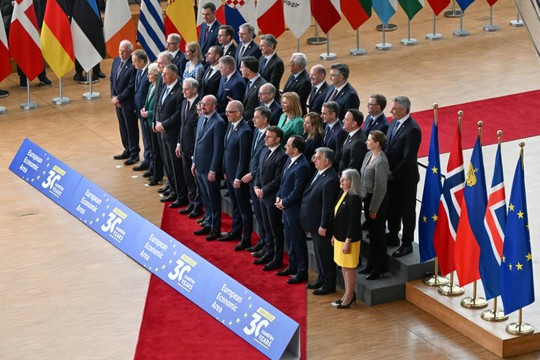For the 27 leaders, the first informal target they are aiming for is political balance. The entire EU is ‘at an angle’...
Photo: Getty Images
Millions of people vote in a European election and then 6 people work out a deal on the EU’s next leadership, notes POLITICO.
When cardinals select a new pope after backroom negotiations in the Vatican, they send out a cloud of white smoke. When EU leaders meet in Brussels to hand out the bloc’s top jobs, they put out a press release.
Apart from that, the two processes are remarkably similar.
On Thursday, the EU’s 27 leaders met in Brussels and signed off on the three top jobs.
Germany’s Ursula von der Leyen, Portugal’s António Costa and Estonia’s Kaja Kallas have been pencilled in by negotiators for the most senior positions at the European Commission, European Council and foreign policy service.
The rules to elect the new EU leadership are largely unwritten. Just like a papal conclave, they are based on long-standing traditions and gentlemen’s (and, in the EU at least, ladies’) agreements. In Rome, some enter as cardinals and leave as bishops. In Brussels, some enter as former national leaders and leave as senior EU officials.
When EU leaders work out the top jobs puzzle, they only have to “take into account” the results of the European election, even though 373 million citizens were eligible to vote in one of the world’s largest democratic exercises — and voters in France, Germany and elsewhere opted for a slate of MEPs that is considerably more conservative and Euroskeptic than the previous class.
While all 27 national leaders gather in the room on Thursday, the group making the decisions is far smaller and representative of the pre-election balance of power. Six negotiators from three political groups — the center-right, socialists and liberals — have already agreed on the trio of leaders, expecting the others will sign off on the deal later this week.
To compound the issue, there are a lot of unwritten rules, said Steven Van Hecke, professor of European politics at KU Leuven. Leaders consider the political, geographic and gender diversity of the candidates.
The rules “are not written in any of the treaties, but they make the puzzle much harder,” Van Hecke added.
Hungarian populist Prime Minister Viktor Orbán lashed out at the news that the six negotiators had already reached an agreement, saying: “EU top officials should represent every member state, not just leftists and liberals!”
For the 27 leaders, the first informal target they are aiming for is political balance — and this is the one place where the EU election results actually play a role, albeit informally.
read more in our Telegram-channel https://t.me/The_International_Affairs

 11:13 28.06.2024 •
11:13 28.06.2024 •























